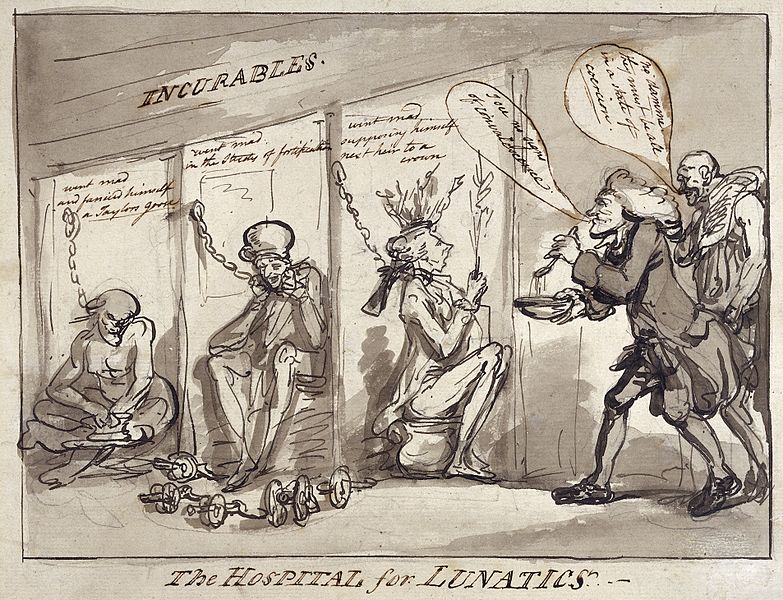Today I introduce a new, occasional feature to my blog. Please see below:
Ron Powers
Voices from the Mental Illness Sub-Nation
 Near the beginning of my recently published book about mental illness, “No One Cares About Crazy People,” I write: Too many of the mentally ill in our country live under conditions of atrocity.”
Near the beginning of my recently published book about mental illness, “No One Cares About Crazy People,” I write: Too many of the mentally ill in our country live under conditions of atrocity.”
I grew convinced of this over the three years of my research into schizophrenia and its related brain afflictions that include schizoaffective disorder and extreme bipolarity. My examples in the book cover the spectrum of atrocity: mis-diagnoses (often “drug overdose”) by doctors; judges who order young victims into jail instead of treatment centers; beatings, deprivation of medications, and the torture of solitary confinement behind bars; death on the streets from bullets fired by untrained police; the daily fog and helplessness of the untreated insane.
These and some other areas—arenas—pretty much covered it, I was convinced. The spectrum of atrocity suffered by the mentally ill in America.
I was wrong.
I had limited my investigations to the barbarities visited on the “crazy people” themselves. Only after the book’s publication in March did a companion realm swim into focus for me: the realm of ordinary people whose lot is to care for the afflicted. These include mothers, fathers, siblings and friends of the helplessly impaired thousands whom our social bureaucracies have neglected and rejected and crushed. In many ways, these family members are damaged and abject as the loved ones they seek in vain to rescue.
No one cares, to coin a phrase, about those who care about crazy people.
This realm rushed at me in emails to my Facebook page and to the blog I created that related to the book. It swelled up within certain websites that I, as a writer about mental illness, was invited to join. These sites are closed off to anyone but relatives of madpeople; an enforced set of agreements keeps their conversations private unless they grant specific permission.
The writers on these sites are almost exclusively mothers—a fact that in itself merits contemplation. Mostly middle-class, they span several income, educational and racial categories. They are seldom “natural” writers, yet no one could mistake what they have to say. They write with the rare pitch of truth-telling passion that James Agee memorably described as “the cruel radiance of what is.”
What they have in common is a collective story more urgent, more morally devastating, more viscerally real, than be expressed by the modes by which outsiders receive information about mental healthcare: statistics and news items and policy statements and political press releases, delivered in detached, passionless prose.
Today, this blog commences an occasional compilation of these mothers’ voices (and those of other relatives as they are available). I have obtained permission from each source quoted, and have withheld identities, although some gave permission for that as well.
My hope here is twofold. One is that the reader will feel the same emotions as I have: shock and indignation that such chaos and neglect exist in America’s mental health-care systems, causing such a vast archipelago of misery and terror. The other is that these voices will encourage others to throw off fears of stigma and shame and begin hurling their own voices, their own testimonies, into the world. Only by putting human faces and voices upon the statistical morass of this ongoing atrocity can we hope to begin decisive, lasting reform.
We will begin with an example of the commonplace indifference and buck-passing at the community level that makes a mockery of the very phrase “mental healthcare system.”
“I have only enough strength this morning for a few lines. [My daughter] was discharged in 2011 with no psychiatric follow up appt. We scrambled to find someone, but before we could, she was readmitted to a second hospitalization. She had to drop out of school for a second time. She was too far behind. The [caregiver] had put her on a drug that literally made her bang her head on the wall. Then she was hospitalized another two weeks, and upon discharge the social worker made no referrals or linkages for her in the community, and would not respond to my inquiry about her diagnosis. I asked and her response was, ‘What does that matter?’
“She came home with us, and for the next two months, it was awful. In February, she was psychotic again, and ran out of the emergency room when I tried to get an evaluation. She was noncompliant with meds, and thought she was pregnant. She spent two weeks in one hospital and I threw a fit about her being sent home to us again because I had a 14-year-old at home to protect. She had become physically aggressive as well. They sent her to a state hospital after my totally pissing them off, and she stayed there for two months.
“My biggest frustration is no linkages, no follow-up, no support, etc. We were treated like nosy people wanting to meddle in our child’s life but, she was sent home to me to deal with every time. And, each and every time, I felt more inadequate to help her and to protect my other child. [Her sister] was terrorized and slept with her bedroom door locked. She also became angry with me, her mom, for not being able to protect her from her sister.”
Sometimes the afflicted family member is not a child, but a parent. Whether or not that parent has consented to treatment—and often they have not—the strain suffered by the spouse and children can be overwhelming. This eloquently written post offers an example:
“I must say that helping my kids to navigate their life in relation to their Daddy’s serious mental illness is serious emotional work. Tonight I held my 10 year old ‘Baby’ girl as she opened up and told me that sometimes she just starts feeling sad and then ALL of her sadness comes over her at once. I held her as she sobbed and sobbed. ‘Why can’t we have a normal family?’ ‘Why can’t we live in our own house where I could have my own room?’ ‘Why did my Daddy have to get sick?’ ‘Will it ever be okay?’ ‘Why can’t the doctors just fix this?”
“I want to know too.
“She voiced the little girl version of the questions that claw at my own heart and mind. The grief and loss come at us in waves. Tonight we sat and cried together. Her tears streaming down my chest and mine in her hair. . .”
The mother below and her son are casualties of grotesque, yet pervasive laws that place the “civil rights” interests of a person in psychosis above the right of a doctor or psychiatrist to order antipsychotic medication and/or involuntary commitment to a center for treatment. In most states, such a patient may be treated against his will only if he “demonstrates a danger to himself or others.” Given that virtually the only way to “demonstrate” such a danger is to enact it, this misbegotten law often has the effect of pushing psychotic young people into criminality.
“When my grandson was 11, we begged for help to keep him safe and out of trouble. Several psychiatrists later and many tears and meds for him, we were told: wait till he gets in trouble with the law. Then he will get help. His school told us the same thing. No one understood that what they were telling us was our fear!! We didn’t want this sweet soul of a kid getting into trouble with the police! We were not that kind of family, he was not that kind of kid! We were not going to let that happen! We would fight, pray, restrict him, take him to every doctor we could find. . .
“When mental illness takes hold of our kids we have no control. Mental illness wins over and over again. He is now 20 and hanging with some more worldly friends, friends whose families must have said and fought for the very same things. We must fight and tell the world how our kids didn’t have a chance. They did not pray for mental illness any more than one would pray for cancer. We need to fight for hospital beds in which to keep our kids safe. Our kids need to be able to have safe places to live, affordable meds, support and understanding of their illness. God hear my prayer!!!”
From this message, and others, it is clear that not even psychiatric doctors can be automatically trusted to have the competence and temperament necessary to help their patients.
“A bad day at the doctors. Our city had to basically shut down [its psychiatric care center] because of diverted funds, but after waiting a year, my loved one got an appointment, which was today. In the past year, we had seen a private psychiatrist who didn’t [ participate in my state’s Medicaid program], but would prescribe anti-anxiety meds to help [forestall involuntary confinement]. But she would no longer see him.
“The appointment started off badly as this new doctor called for security before my son even went into the office—possibly because of [troubling] paperwork he had filled out or because of his unusual look. In any case, the security thing set him off more than usual and the doctor made him leave and he is not allowed to return. I listened to the usual four-letter tirade all the way home, my son saying he would never go to another doctor again and don’t ever ask him to. He got out of the car before I came to a full stop at the house. I am so not looking forward to what will happen tonight. De-escalation armor on.”
And then there is the judicial system. As with psychiatrists and doctors, judges are commonly assumed (by outsiders and families of the afflicted alike) to be specifically educated in the neuroscience of chronic mental illness. They are assumed to recognize their moral duty to proceed with exceptional care and knowledge in adjudicating the fate of the most helpless people on earth. Doctors and jailers, of course, are bound by the same expectations.
A special test of that duty is their understanding—or lack of it—of the fact that the single most destructive action against a mentally ill inmate (in fact, against any inmate) solitary confinement, which quickly trigger and/or deepen psychosis.
Judging by the content of this mother’s message, her schizophrenic son has been failed by everyone in this chain. Both he and his mother have paid the price.
“My son’s court case is tomorrow. What’s tragic is the fact I begged for help since November 1. I faxed over a Do Not Release letter stating he was a serious harm to himself and me. Now, my son has spent three months in jail and has been allowed to deny all medications. My son suffers from anosognosia [a clinical term meaning “lack of insight into one’s mental illness”]. So, tomorrow, he learns the painful truth that his competency evaluation came back not competent to proceed.
“My son believes he aced [his mental competency test] and is coming home to me. But the doctor found him incompetent. No shocker there! If they had only listened to me back on November 1, he wouldn’t have had to spend three months and counting in jail! Plus, I wouldn’t have been severely beaten and cornered in my own bathroom [by him] for a second time. Now, my severely delusional child has been off all medication for a month. Talk about starting from ground zero!
“What he will experience tomorrow will be criminal. He will learn he’s incompetent, while wearing shackles and handcuffs. I fucking hate our system!!! He doesn’t understand his illness. His rights will be taken away. He will suffer from the phases of grief even though it is he who is lost to us. He will be left in a jail cell awaiting placement in the state hospital, which could take one to three months because the waiting list is so long.
“I begged with my son to call Disability Rights to represent him but he said he didn’t have a disability even though he’s received Disability for 5 years! What’s even more fucked up is that Disability Rights said they could only talk to my seriously delusional child. That is why he had to call! What a joke! I know so many parents who have lost their children with a serious mental illness in jail. So, please pray and send out positive messages into the universe that he makes it through, and finally receives the help he deserves!
This mother’s son was a small and thin 17-year-old, when local police arrested him for trespassing. The mother writes that, in a psychotic state, he had wandered into a neighbor’s house and fell asleep on a couch. The neighbors called police, and who, instead of taking him to a care facility, put him in jail. The mother has repeatedly called for compassion and treatment for him; so far, her calls have been ignored.
“Today is another day. It’s so hard to move forward with my life. We are stuck in this insane limbo. My son called today [from jail], and says mommy, ‘the inmates that hand out the trays they took most of the food off my tray. The guards were standing there. They said I have to pay a debt. They say I have to pay them if I want to eat. Put money in [X]’s commissary Account so I can eat.’ Over the past month, our son was in solitary confinement for almost two weeks. They stopped his antipsychotics cold for four days. He has psychosis, and is hearing voices. After the assault [by inmates] two weeks ago, he has a concussion.
“He’s been denied an MRI, or an emergency-room visit, despite my pleas. His vision is blurry, headaches, and nausea. He is emotional from the head injury. They will not wake him for his morning antidepressants. Now tonight he has informed us they are trying to extort money by starving him. So he was crying again tonight. We hope next month he sees the forensic psychiatrist.
“[The jailers] extort money for visits, commissary, basic necessities, phone calls, fees, per-day jail incarceration fees, fines, restitution, medicines, doctor fees, etc. Our son was charged as an adult at 17. The boy who dances like Michael Jackson, and plays 5 instruments. He hears voices. He has auditory hallucinations, and Asperger’s. Fifteen times, I tried to hospitalize him. Instead He went to jail where he spent weeks at a time in solitary confinement. He was beat up, his vision is still affected. He still had not had an mri.,. Tonight he sits in jail at just 18. He is not a hardened criminal. He’s a good, sweet kid, he wouldn’t hurt a fly. Every day I pray he will come out of this alive. My heart is shattered!
Here is another example of solitary confinement used as a blunt instrument—to effectively punish the victim of a jail beating.
“I just got off the phone with my son. He was beaten up two weeks ago [by inmates], and the jail’s answer was to put him in lockdown [solitary confinement] for 23 hours a day by himself. I had him agreeing to meds but they gave him the wrong meds and now he won’t trust them. He has been in the county jail for six months, and finally saw a judge for the first time last week. Now they need six weeks’ revaluation. Meanwhile, they keep him alone in lock up. He can call me on his hour out. He just called screaming and crying to get him out. I can only tell him he needs to hang in there and we are doing the best we can. But he’s slipping more. And nobody in the courts seems to care. My heart is breaking. His birthday is Wednesday. I am a single parent, and he’s my youngest.”
And here is another example of the foolish inadequacy of “danger to himself or others.” Given that virtually the only way to “demonstrate” such a danger is to enact it, the law generally does more harm than good.
“The doctor told me, “‘Wait, N—, he’s not bad enough yet, he hasn’t committed a crime!’ [And then he said], ‘Your son is an adult. He has the right to be crazy if he chooses.’
My son has slipped through the cracks in every instance. There’s no consideration for families living with an untreated psychotic person except when it’s too late. We live in fear of our own son.”




















 Near the beginning of my recently published book about mental illness, “No One Cares About Crazy People,” I write:
Near the beginning of my recently published book about mental illness, “No One Cares About Crazy People,” I write: